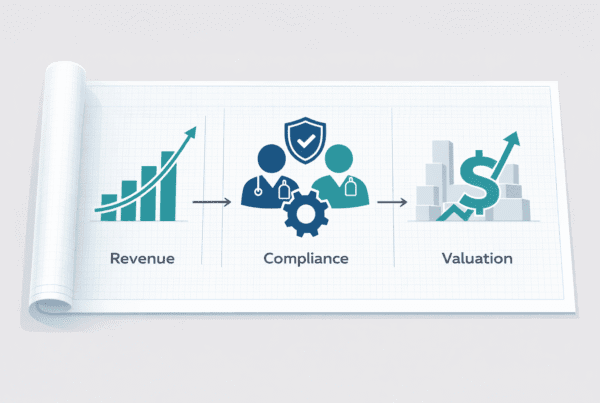
When you decide to sell your medical practice, you know you need a core group of experts to lead the charge. Your transaction advisor orchestrates the deal, and your legal counsel protects your interests. But the success of a healthcare transaction often depends on a supporting cast of specialists who manage the risks hiding just beneath the surface.
While a general M&A process has its challenges, healthcare deals involve unique operational, regulatory, and human complexities. Overlooking these can lead to a lower valuation, a failed deal, or significant liabilities after you’ve closed. This is where specialized consultants for compliance, HR, and IT become essential members of your healthcare M&A advisory team. They are your defense against the unseen risks that can derail even the most promising transactions.
The Compliance Consultant: Your Regulatory Shield
In healthcare, “compliance” isn’t a suggestion—it’s a minefield that can blow up a deal. A buyer isn’t just acquiring your assets and revenue; they are also inheriting your compliance history. A specialized healthcare compliance consultant conducts a deep-dive audit to identify and resolve issues before they become deal-breakers.
Their work goes far beyond a simple legal review. They focus on:
- HIPAA & Data Privacy Audits: Buyers are intensely focused on data security. A consultant will review your patient data handling, business associate agreements, and security protocols to ensure you’re not exposed to breaches or penalties that could devalue your practice.
- Stark Law & Anti-Kickback Review: Your physician compensation plans and referral relationships will be scrutinized. A consultant analyzes these structures to ensure they comply with federal and state regulations. Discovering a non-compliant compensation model during due diligence can bring a deal to a halt. For more information, you can read our guide on navigating Stark Law and Anti-Kickback statues.
- Coding & Billing Audits: Your past billing practices are a direct predictor of future revenue quality. Consultants perform audits to identify patterns of upcoding, downcoding, or billing for non-reimbursable services. Uncovering these issues early allows you to correct them, rather than having a buyer use them to argue for a lower purchase price.
Think of it this way: selling a practice with unverified compliance is like selling a house without an inspection. You might get an offer, but the moment the buyer finds a cracked foundation, the deal is in jeopardy.
The HR Consultant: Protecting Your Most Valuable Asset—Your People
A medical practice is not just equipment and a patient list. Its true value lies in the skilled providers and dedicated staff who deliver care every day. A buyer knows this, which is why ensuring a smooth transition for your team is a critical part of any successful transaction. An HR M&A consultant specializes in the human side of the deal.
Their focus is on preserving value and minimizing disruption by managing:
- Employee Due Diligence: They review employment agreements, benefits packages, and compensation structures to identify any discrepancies between your practice and the buyer’s. Aligning these elements is key to a smooth integration.
- Cultural Alignment: Will your “patient a priority” culture clash with a buyer’s more corporate, metrics-driven approach? An HR consultant can assess cultural compatibility and help develop a plan to merge two different work environments, reducing post-close friction.
- Retention and Transition Planning: Your key physicians and staff are your practice’s biggest asset. An HR consultant helps structure retention bonuses and effective communication plans to keep your top talent on board through the transition and beyond. This is crucial when navigating new physician employment contracts post-sale.
Without this expertise, you risk a talent exodus and a drop in morale that can cripple the practice’s performance right after closing—just when performance matters most for any earnout payments.
The IT & EMR Consultant: Bridging the Digital Divide
Nothing brings a medical practice to a standstill faster than a failed technology integration. Merging IT systems, especially Electronic Medical Records (EMR) or Electronic Health Records (EHR), is one of the most technically complex and expensive parts of a healthcare acquisition. An IT M&A consultant ensures this process is a smooth transition, not a catastrophic failure.
Their role is critical before, during, and after the deal. Resolving these issues is a key factor in any successful merger, which you can learn more about in our guide to technology and EMR integration challenges.
| Phase | Key Responsibilities of an IT Consultant |
|---|---|
| Pre-Deal Diligence | – IT Environment Audit: Assess the state of your hardware, software, and network infrastructure. – Cybersecurity Risk Assessment: Identify vulnerabilities that could pose a threat to the buyer. – System Compatibility Review: Determine how easily your EMR/EHR can integrate with the buyer’s system. |
| During the Deal | – Integration Planning: Create a detailed roadmap and timeline for merging all technology platforms. – Data Migration Strategy: Develop a secure and compliant plan for transferring sensitive patient data from one system to another. |
| Post-Close Integration | – Execution Oversight: Manage the technical teams responsible for the integration. – Troubleshooting: Quickly resolve issues that arise post-merger to ensure continuity of care and business operations. |
A botched IT integration can lead to lost patient data, chaotic billing cycles, and frustrated providers. A specialized IT consultant ensures the digital backbone of your practice remains strong throughout the transition.
Engaging Your Specialists: Timing, Coordination, and Getting It Right
Bringing in these specialists is not a last-minute decision. The highest value is realized when they are engaged early in the M&A process. Identifying compliance, HR, or IT issues during the preparation phase gives you time to fix them, strengthening your negotiating position and maximizing your practice’s value.
This is where a skilled transaction advisor like SovDoc makes a significant difference. We don’t just focus on the financial model; we manage the entire process. We act as the quarterback for your advisory team, recognizing when to bring in specialized consultants and coordinating their efforts to ensure everyone is working toward the same goal. We help you build a plan for specialized post-transaction support long before the deal closes.
Your practice is the result of years of your hard work. By assembling the right team of specialists, you ensure its legacy is protected and its value is fully realized.
If you are considering a sale and want to understand the potential risks in your practice, contact us for a confidential discussion. We can help you build the right advisory team to navigate the process with confidence.
Frequently Asked Questions
What are the biggest compliance risks when selling a medical practice?
The biggest compliance risks include HIPAA and data privacy breaches, non-compliance with Stark Law and Anti-Kickback statutes related to physician compensation and referral patterns, and improper coding and billing practices. Addressing these risks early through specialized compliance audits is crucial to avoid deal delays or valuation reductions.
Do I need a separate IT consultant for my healthcare practice merger?
Yes, an IT consultant is essential as IT integration is one of the most complex and costly aspects of a healthcare merger. They perform due diligence on the IT environment and cybersecurity risks before the deal, plan EMR/EHR integration during the deal, and oversee technical integration post-close to ensure continuity of care and operations.
How can an HR consultant help prevent staff from leaving after selling the practice?
An HR consultant helps by reviewing employment contracts and benefits to align with the buyer, assessing cultural compatibility to reduce friction, and designing retention bonuses and communication plans to keep key physicians and staff engaged through the transition and beyond.
What is involved in a HIPAA audit during an M&A deal and who performs it?
A specialized healthcare compliance consultant performs a HIPAA audit, reviewing patient data handling, business associate agreements, and security protocols to identify potential data breaches or penalties. This audit is essential to assure the buyer that data privacy risks are minimized in the transaction.
When should I engage compliance, HR, and IT consultants during the practice sale process?
It’s critical to engage these specialized consultants early in the M&A process, during preparation. Early involvement allows time to identify and fix issues, which strengthens negotiating position and maximizes the practice’s value. A transaction advisor like SovDoc can coordinate the timing and collaboration of these experts.



